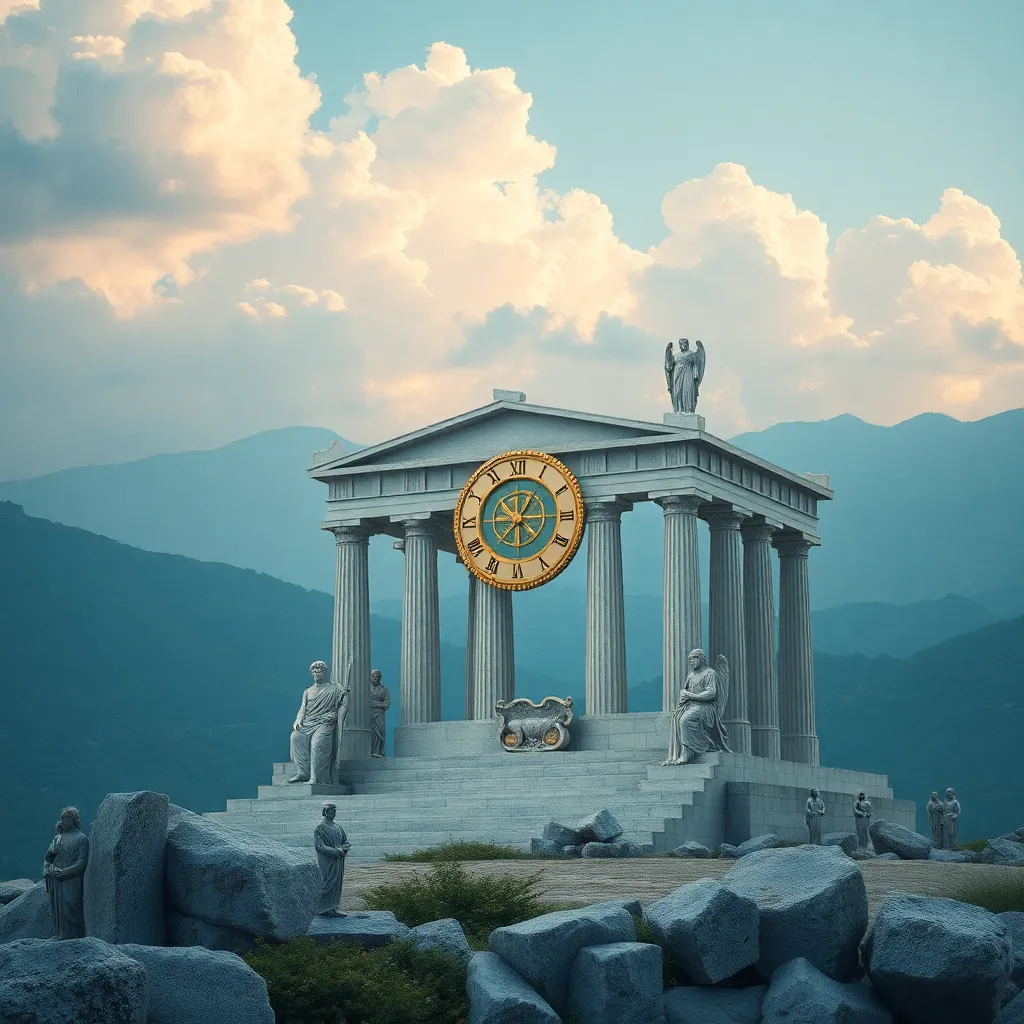The Olympians and the Concept of Time: Myths and Chronology
I. Introduction
Greek mythology is rich with tales of gods, heroes, and the profound mysteries of existence. At the center of this mythos lies the pantheon of the Olympian gods, each embodying different aspects of life and the universe. The concept of time is intricately woven into these narratives, influencing events and the characters involved. This article aims to explore how the myths of the Olympians intersect with various concepts of time, providing insight into their significance within Greek mythology.
II. The Olympian Pantheon: An Overview
The Olympians are the principal deities in Greek mythology, residing atop Mount Olympus. Here are some key figures:
- Zeus: King of the gods, god of the sky and thunder.
- Hera: Queen of the gods, goddess of marriage and family.
- Poseidon: God of the sea and earthquakes.
- Athena: Goddess of wisdom and warfare.
- Dionysus: God of wine, pleasure, and festivity.
Each of these gods plays a role in shaping the understanding of time within myths. For example, Zeus, often associated with authority and order, represents a linear progression of time, while deities like Dionysus evoke the cyclical nature of time through seasonal festivals.
III. Time in Greek Mythology: Linear vs. Cyclical
In Greek mythology, time can be understood in two distinct ways: linear and cyclical. Linear time suggests a progression from past to future, while cyclical time embodies repetition and renewal.
The Olympians exemplify both concepts:
- Linear Time: The reign of Zeus signifies a new order, establishing a timeline in which events unfold sequentially, such as the rise of heroes and the establishment of laws.
- Cyclical Time: The seasonal festivals honoring Demeter and Persephone illustrate the cycles of nature, emphasizing rebirth and renewal through the agricultural calendar.
Myths such as the story of Persephone’s descent into the Underworld demonstrate this cyclical nature, as her annual return marks the arrival of spring and the renewal of life.
IV. Creation Myths and the Origin of Time
Creation myths are foundational narratives that often outline the origins of time itself. In Greek mythology, two key figures associated with time are Chronos and Kairos:
- Chronos: Often conflated with time itself, he represents the relentless passage of time.
- Kairos: Represents the opportune moment, highlighting the importance of timing in actions and decisions.
These figures appear in various creation myths, such as the emergence of the cosmos from Chaos and the establishment of order by the Olympians. The implications of these myths underscore the Greeks’ understanding of time as both an ongoing process and a series of pivotal moments that shape existence.
V. Mythological Events and Their Temporal Context
Major mythological events involving the Olympians are often situated within a broader timeline that reflects their significance:
- Titanomachy: The battle between the Olympians and the Titans, marking the transition from one era to another.
- Gigantomachy: The struggle against the giants, which solidifies the Olympians’ dominance.
These events are not merely historical; they recontextualize time by introducing themes of conflict, resolution, and the cyclical nature of power dynamics among the gods.
VI. The Influence of Seasons and Natural Cycles
The Olympians are deeply connected to the changing seasons and the natural cycles of life. Key deities associated with these themes include:
- Demeter: Goddess of agriculture, whose grief over Persephone’s absence leads to winter.
- Persephone: Her annual cycle of descent and return mirrors the agricultural cycle of planting and harvest.
These myths illustrate the relationship between the Olympians and the passage of time, as the cycles of nature influence human activities, agriculture, and cultural practices.
VII. The Concept of Fate and Time in Olympian Myths
Fate, personified by the Moirai (Fates), plays a critical role in Greek mythology, intertwining with the actions of the Olympians:
- The Moirai: Clotho, Lachesis, and Atropos control the thread of life, determining the destiny of gods and mortals alike.
- Fate vs. Free Will: The tension between the predetermined paths set by the Fates and the choices made by the Olympians raises philosophical questions about the nature of time and destiny.
This interplay illustrates how fate and time are inextricably linked within the realm of the Olympians, shaping their narratives and the outcomes of their actions.
VIII. Conclusion
In summary, the exploration of the Olympians and their connection to the concept of time reveals a rich tapestry of narratives that shape our understanding of existence. The intersection of linear and cyclical time, creation myths, major events, and the influence of fate all contribute to a complex portrayal of time in Greek mythology.
The enduring legacy of these myths continues to resonate, inviting further exploration of how mythology informs our understanding of temporal concepts in the modern world.




